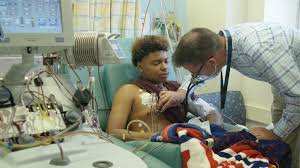Korede Abdullah in Lagoa
The Oyo State Health Insurance Agency (OYSHIA) has partnered with the Sickle Cell Hope Alive Foundation (SCHAF) to introduce a health insurance program specifically designed for individuals living with sickle cell disease.
This initiative aims to alleviate the healthcare expenses and improve the overall wellbeing of those affected.
According to Dr. Sola Akande, Executive Secretary of OYSHIA, the scheme will provide 800 individuals with sickle cell disease in Oyo State with access to essential healthcare services.
“Health insurance is for everybody, and it’s basically healthcare financing to get the maximum desired healthcare services,” Dr. Akande explained.
He emphasized that those without financial capability experience sickle cell crises more often, and by covering hospital bills, they will have more resources to maintain a healthy lifestyle.
Represented by OYSHIA’s Director of Marketing and Quality Assurance, Mr. Dauda Stephen, Dr. Akande highlighted the importance of reducing self-medication.
“Once you have health insurance, use it. Don’t do any self-medication. Before you take any drug, go to the hospital to see the doctor. Let the doctor run tests if need be, then the prescription will be from an informed decision by the doctor.”, he said.
Professor Adeyinka Falusi, founder of SCHAF, praised the initiative, stating that health insurance will significantly improve the health status of those living with sickle cell disease.
According to Prof Falusi, “So if Oyo State has decided to give them health insurance, it’s a great break for them. This will improve their health status because they will not be afraid to go to hospitals. As they feel ill, they will get treatment.”
However, Prof. Falusi also called on the federal government to extend free health insurance to all Nigerians with sickle cell disease and incorporate education about the disease into school curricula.
“Nigeria is the epicentre for sickle cell disease. We can’t just keep quiet. In different areas, the federal government can do something. Let’s have a curriculum that teaches children right from youth to know about the disease.”, she said.
Citing Bahrain’s success in reducing its sickle cell patient population from 2.1% to 0.2% over 37 years, Prof. Falusi emphasized that Nigeria can achieve similar results.
“The government has to step in. Right from pregnancy, you do prenatal diagnosis free of charge. So, the mother before birth knows that she’s carrying a child with sickle cell disease and is prepared to receive that child.” Prof Falusi concluded.



